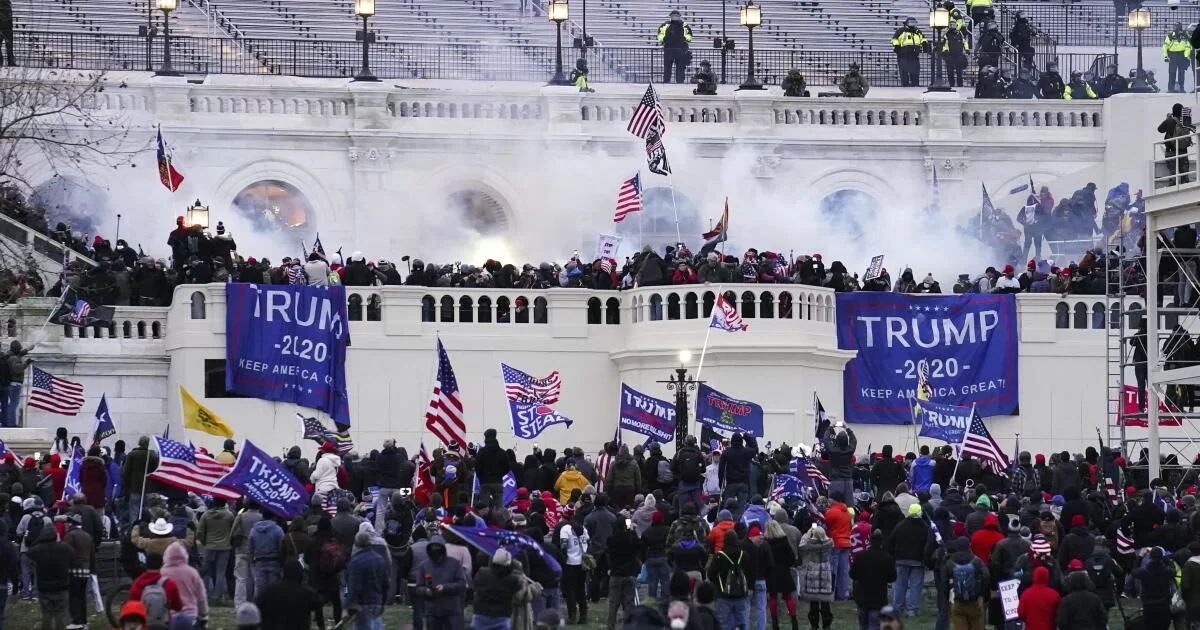The court’s conservatives questioned whether the 2002 Sarbanes-Oxley Act, which was aimed at corporate accounting fraud, can be used more broadly to prosecute those who obstruct “any official proceeding,” including Congress’ 2021 certification of President Biden’s election victory.
Chief Justice John G. Roberts Jr. and Justice Neil M. Gorsuch noted that the law made it a crime to destroy or conceal documents to impair an “official proceeding,” but they voiced doubt over extending it to any disruptions of a proceeding.
“Would a sit-in that disrupts a trial qualify?” Gorsuch asked. “Would a heckler in today’s audience qualify? Would pulling a fire alarm before a vote qualify for 20 years in prison?”
While the court’s three liberals appeared to agree with prosecutors that law can be read broadly, the six conservatives sounded skeptical.
A ruling that limits the obstruction law could also undercut the prosecution of former President Trump. Two of the four criminal charges against him are based on the obstruction law.
Special counsel Jack Smith, however, has said the charges against Trump rest on stronger grounds because Trump allegedly schemed to submit false slates of electors to Congress.
Trump’s case did not figure in Tuesday’s argument. Next week, justices will hear Trump’s claim that he is immune from criminal charges that arose from his “official acts” as president.
The court’s ruling in Fischer vs. United States could also deal a blow to other Jan. 6 prosecutions, though it would not prevent the punishing of those who broke into the Capitol on the day Congress was due to certify President Biden’s victory in the 2020 election.
More than 1,200 of the rioters were arrested for their actions. Most were charged with assaulting the police officers who were on duty or with disorderly and disruptive conduct. Some were also charged with carrying dangerous or deadly weapons.
The FBI delved into the backgrounds and motives of those who came to the Capitol. Based on those investigations, about 330 of the rioters were also charged with seeking to obstruct an official proceeding.
One of those was Joseph Fischer, an off-duty Pennsylvania police officer, who said on social media that he expected the attack on the Capitol “might get violent” but that it was needed “to send a message that we the people hold the real power.”
When Fischer was arrested, he was charged with six counts of assault and disruption as well as a seventh charge of obstruction, a felony charge which could send him to prison for several years.
A federal judge rejected the obstruction charge in his case, but the U.S. Court of Appeals restored it in a 2-1 decision.
The Supreme Court agreed to hear his appeal.
Most of the justices describe themselves as “textualists” who decide cases based on the words of the laws. But in this case, like many others, the words can be read differently.
The Sarbanes-Oxley law was adopted after the collapse of energy firm Enron in an accounting scandal that also took down the Arthur Andersen accounting firm.
Congress wanted to make clear that shredding documents could be prosecuted as a crime.
At issue was how to interpret two clauses in the law. It says it’s a crime if someone “corruptly alters, destroys, mutilates, or conceals a record, document, or other object, or attempts to do so, with the intent to impair the object’s integrity or availability for use in an official proceeding; or otherwise obstructs, influences, or impedes any official proceeding, or attempts to do so.”
U.S. Solicitor Gen. Elizabeth Prelogar said the prosecutions rely on a “straightforward application” of the law as written.
“A violent mob stormed the United States Capitol and disrupted the peaceful transition of power,” she said. “In plain English, the fundamental wrong committed by many of the rioters, including [Fischer], was a deliberate attempt to stop the joint session of Congress from certifying the results of the election. That is, they obstructed Congress’s work in that official proceeding.”
But she had barely finished her opening before the chief justice said he saw it differently.
Roberts said the justices have often said that the words of the law are read based on the full text. “The general phrase is controlled and defined by reference to the terms that precede it,” he told her.
That means the law is about concealing documents and records. “You can’t look at it as if it’s standing alone” as a general provision applying to disruptions of official proceedings, he said.
The court’s conservatives have often taken a skeptical view of prosecutions that rely on a broad reading of a criminal statute.
Justice Clarence Thomas, who was back on the bench after a one-day absence, pressed Prelogar on whether the government had used the law against other “violent protests.”
“There have been many violent protests that interfered with proceedings,” he said. “Has the government applied this provision to other protests in the past?”
Prelogar said she did not have a ready example of “enforcing it in a situation where people have violently stormed a building in order to prevent an official proceeding. That’s because I’m not aware of that circumstance ever happening prior to Jan. 6,” she said.
The justices are likely to hand down a ruling in the case in late June.
